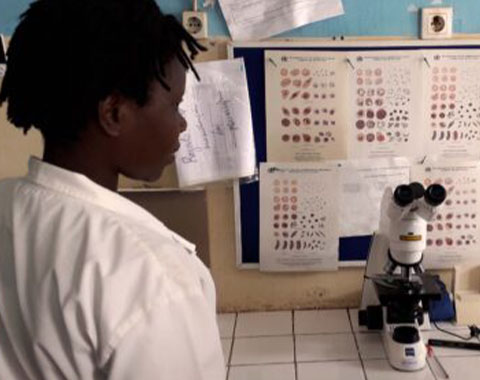Health Intervention at the Maternal and Child Hospital in Mafuiane and the District Hospital of Naamacha
The project includes the provision of protective equipment for the health personnel and patients of the two healthcare centers, the installation of oxygen-therapy equipment, and, in particular, promotes the use of ultrasound for the thorax-pulmonary examination of Covid-19 patients. The intervention was realised at both the District Hospital of Namaacha and the Maternal and Child Hospital of Mafuiane so that they guarantee the full coverage of the Maputo District, an area in close proximity to South Africa which saw the first Covid-19 outbreak in Subsaharan Africa.

The ultrasound exam for the diagnosis of lung disease caused by Covid-19 offers many advantages: the instrument has wide clinical versatility, the possibility of performing an exam directly at the patient’s bedside avoids them from moving to other premises and exposure to radiological examinations, the ease of disinfection, repeatability over time and, in the case of pregnant women, both fetal and pulmonary evaluations can simultaneously be performed by one medic which consequently reduces the contact exposure between clinical personnel and patients. In particular, the thorax ultrasound appears to be a dynamic diagnostic tool, without risks and also executable at home. If it is available, the portable device can limit the situations of contagion risk present in the transportation of patients to crowded health centers. Furthermore, the exam is able to intercept the smallest initial alterations of lung disease, estimate a severity index and follow its evolution. Together with the clinic, such an examination becomes essential for an early diagnosis and for an adequate prognostic evaluation in support of the management of the clinical course and of any hospitalization decision.
Training Initiative – “Unidos apesar de distantes” (United but far apart)
The project intends to raise awareness among the resident population in both the urban (Maputo and Matola) and the rural areas (Namaacha District, Boane and Moamba) of the Diocese of Maputo with respect to the risks of the Covid-19 epidemic and to the prevention initiatives to be activated. The initiative provides information and training activities to be carried out both in direct contact with the local population and remotely accross social networks and, with an enhancement of the consolidated network of contacts and relations of the Diocese and Caritas of Mozambique, it aims to also involve areas outside the Diocesan territory of Maputo.

The training will be aimed at the Mozambican health workers that will play an active role in the dissemination of the prevention, diagnosis and health treatment plan for those infected by Covid-19. For the definition of the contents, which will be translated in the local language (Changano), reference will be made to scientific information provided by the World Health Organisation – WHO.
The project involves the following activities:
- The creation of videos and information spots aimed at the local population on the correct behavioral rules to be respected to avoid contagion. To be transmitted on social networks and on closed circuit monitors already present in health centres, parishes and public spaces;
- Installation of itinerant health points in health centers, local markets, parishes, and border areas where the social-health and educational personnel will come into contact with the local population, provide basic health and hygiene consultancies, distribute locally made masks and ten thousand information brochures in Portuguese and Changano. It will also be possible to measure their temperature and eventually activate the diagnostic assessment and health treatment protocol;
- Production of masks made by volunteers of the Diocese and Caritas;
- Remote training sessions and technical assistance for the local health personnel carried out by the professors of the Faculty of Medicine and Surgery of the Catholic University of the Sacred Heart by the doctors of the Polyclinic University “A. Gemelli”.








